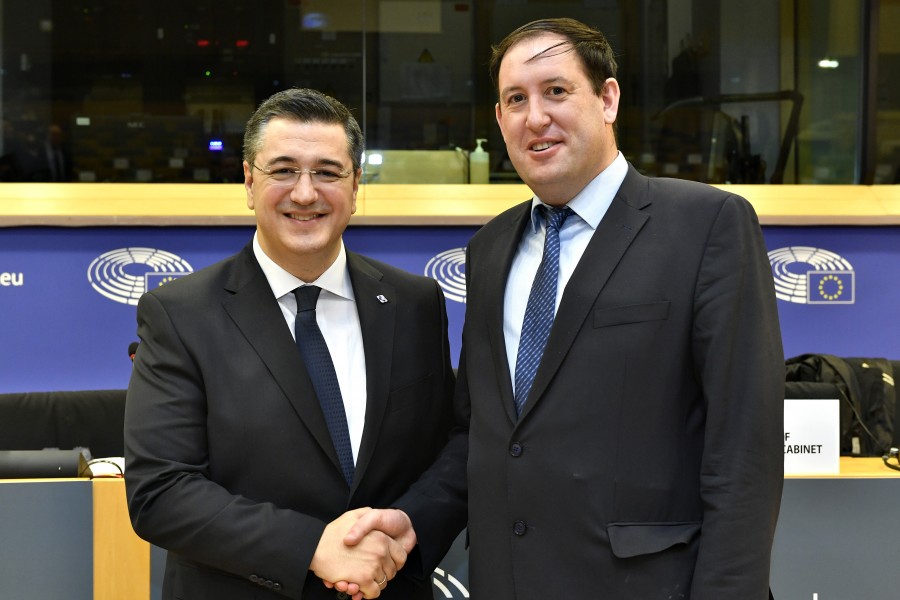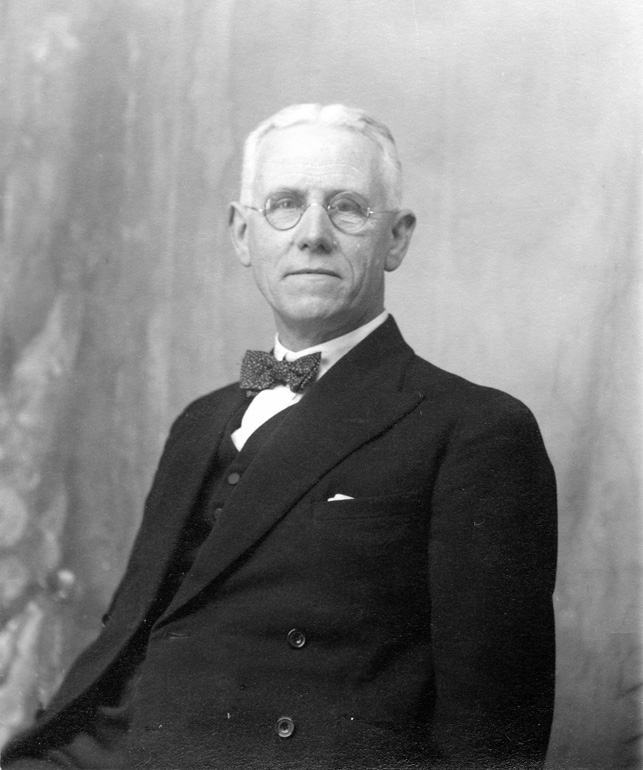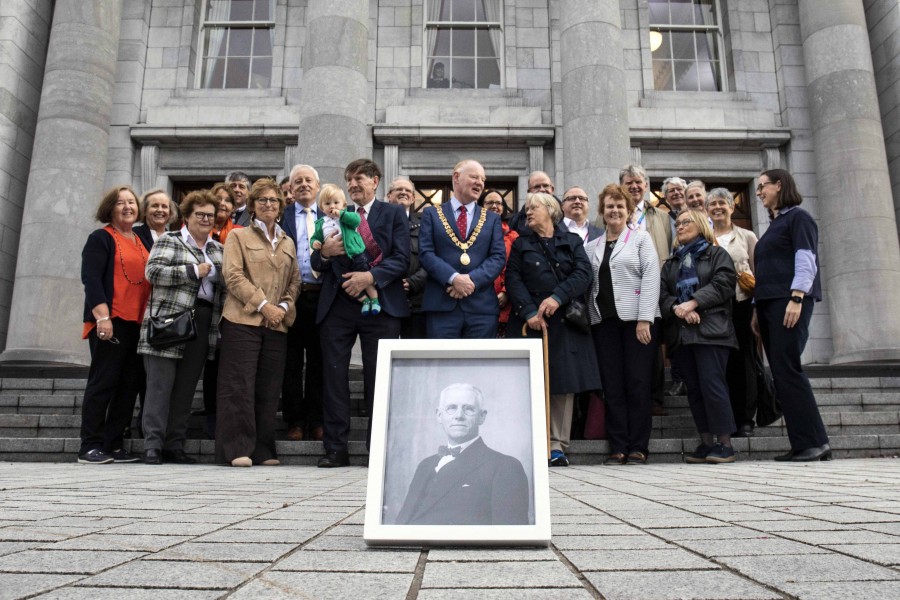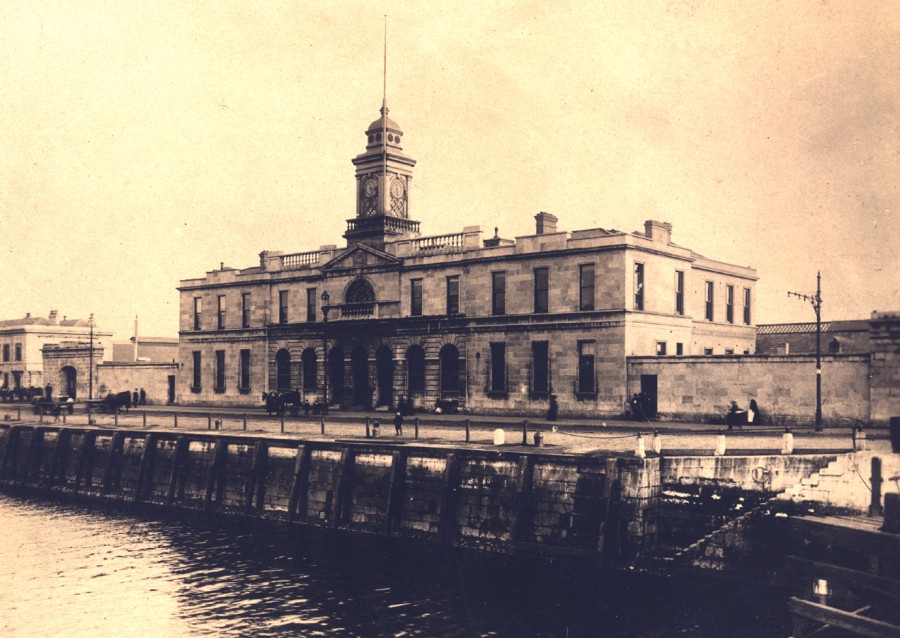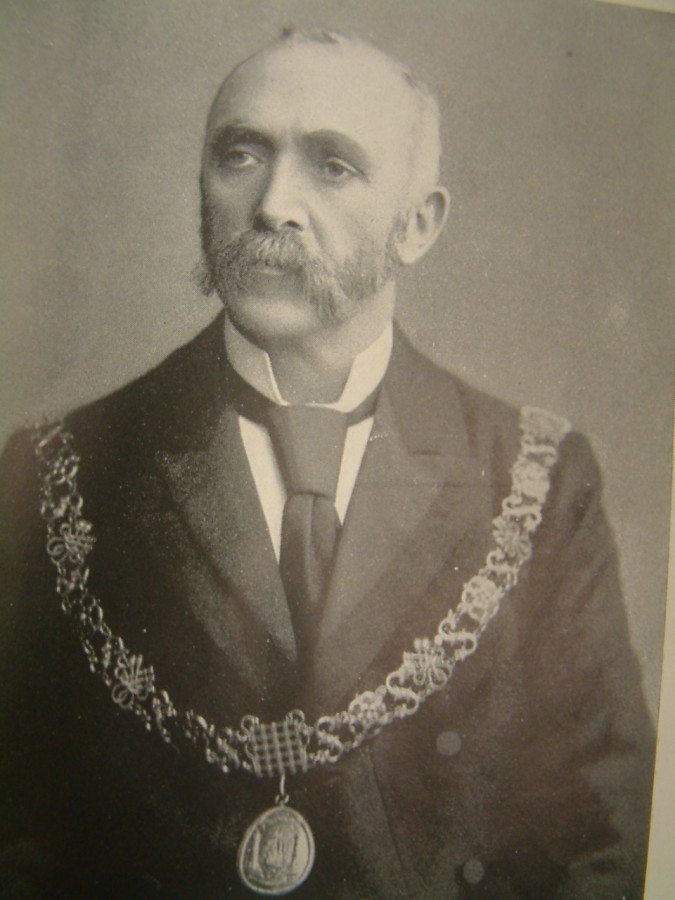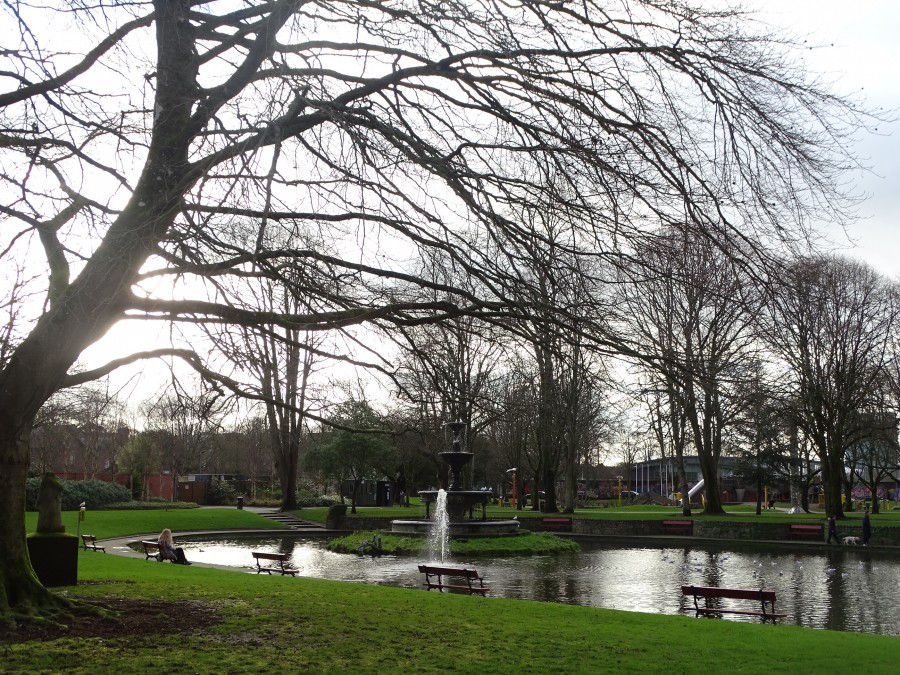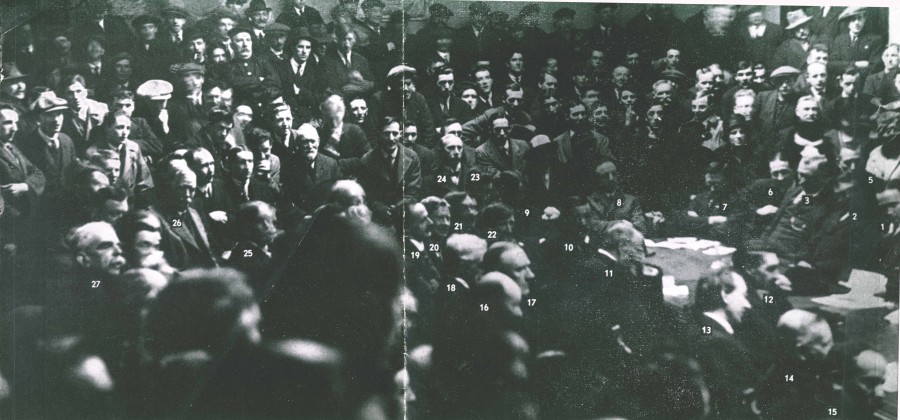Kieran’s Our City, Our Town, 13 February 2020
Kieran’s Our City, Our Town Article,
Cork Independent, 13 February 2020
Remembering 1920: Made in Ireland
The first meeting of the Council of the Cork Industrial Development Association (Cork IDA) for 1920 was held at the offices of the Association on Monday 2 February. Mr J C Dowdall, President, occupied the chair. The others present included the Lord Mayor of Cork Alderman Tomás Mac Curtain and acting secretary Liam de Róiste.
The President welcomed the Lord Mayor to their meeting and expressed appreciation of the Lord Mayor’s interest in the work of industrial development. Continuing he said that while that Association had found that the old Corporation assisted in the city’s development as best it could, they all expected great things from the new body in the way of assistance for the industrial progress of Cork. There were great opportunities arising at the present time, and he trusted and believed that those opportunities would be availed of by the Municipal Council, and full advantage taken of them to promote the welfare of their city. Lord Mayor MacCurtain, who was received with applause speaking in Irish and English, thanked the President and members for the welcome accorded him. As an old member of the Council he regretted lie had been unable to attend the meeting for some time past. He could assure the Council that so far as lay in his power, he would do what he could to forward the city’s interests.
The meeting minutes, as published in the Cork Examiner, laid out the annual financial statement and officers were elected for the ensuing twelve months. Much tribute was paid to the work of Diarmuid Fawsitt who was liasing with US companies and making them aware of Cork’s business interests and the Cork IDA with much success.
In the present day, Cork City and County Archives and archivist Brian McGee have received family papers belonging to Diarmuid Fawsitt (from present day family members). The archive allows a stronger reading of Diarmuid’s successful work in promoting Cork and Ireland abroad in 1920. The archive comprises a large collection of documents such as correspondence, diaries, photographs, news clippings, articles, speeches, lectures, and ephemera related to his involvement in many causes and organisations, as well as more personal material. The archive is of high quality and has been kept with care over generations by the Fawsitt family.
An obituary on 5 April 1967 published in the Cork Examiner also records elements of Diarmuid’s work. He was born near Blarney Street in Cork’s northside in 1884. Diarmuid was active in cultural, industrial and nationalist circles, including the Celtic Literary Society, Sinn Féin, the Gaelic League, Cork National Theatre Society, and especially the Cork Industrial Development Association.
Diarmuid established the Cork IDA in 1903 with fellow Corkman E J Riordan following the successful Cork International Exhibition. Its members soon included important Irish manufacturers and traders. They insisted on themselves buying Irish made goods and persuading others to do likewise. They held meetings throughout the country and within a few years similar bodies were established in Dublin, Limerick, Belfast, Galway and Derry. One of the chief successes was to gain legal recognition for the Irish National trade mark, Déanta in Éireann (Made in Ireland), which went far towards preventing the bogus sale of so called Irish products. With the help of John Boland MP for Kerry, advantage was taken of a new bill, which made it possible to registrar and enforce a national trade mark. The Cork IDA instituted numerous prosecutions, which soon restricted the previous abuse of Irish names and labels. It also gave help to firms, which were willing to start new industries in Ireland.
During the First World War years, the Cork IDA were repeatedly thwarted in its efforts to fund new industries, even in fields where war shortages were most acute. Strong approaches to British government departments showed what scope there was in Irish manufactures and in Irish raw materials. But suspicion of Irish hostility towards the was effort prevented the beginnings, which might easily have been made in those years. A notable win was the advent of the Ford Tractor Company to Cork Docklands in 1917, which the Cork IDA provided advice and support.
Coinciding with Diarmuid’s strong lobbying of the British government, in November 1913 Diarmuid Fawsitt attended the inaugural meeting of the Irish Volunteers in Dublin and was inducted into the Irish Republican Brotherhood. In December 1913 he was one of the co-founders of the Cork Corps of the Irish Volunteers at Cork City Hall, later becoming Chairperson of the Executive. During the War of Independence, Arthur Griffith sent Fawsitt to the United States as consul and trade commissioner of the Irish Republic. He was based in New York.
One hundred years ago in February 1920, Diarmuid Fawsitt made arrangements for the visit to Ireland of Mr K J McCormack of the Moore and McCormack Shipping Company of 5 Broadway, New York. The American company had bought several surplus ships after the First World War and had trading links to the eastern Mediterranean, India and South America. The Cork Harbour Board met Mr McCormack and gave much information relative to the economic position of Cork harbour.
At the same time Diarmuid Fawsitt directed the Cork IDA to consider and report on the organisation of a Foreign Commerce Department of the Association to work in co-operation with other bodies interested in foreign commerce already established in Dublin and Belfast. The provision of return cargoes to the United States, particularly with reference to cured mackerel was deemed important. There was also a big demand in the States for Irish tweeds, seeds, raw material for paper making and other commodities.
The Cork IDA with Diarmuid Fawsitt in New York were well poised for success in the months and years to come with France and Germany in particularly focussed on.
More in the coming weeks…
Captions:
1035a. Diarmuid Fawsitt (source: Cork City and County Archives).
1035b. Present day members of Fawsitt Family with Lord Mayor of Cork, Cllr John Sheehan, September 2019 (picture: Clare Keogh).
Kieran’s Question to CE and Motions, Cork City Council Meeting, 10 February 2020
Question to CE:
To ask the CE about the mechanisms in place to combat homelessness this past winter season in the city?
How many homelessness cases on the streets in the two weeks of January 2020?
Are their beds available for all homelessness at this point in time in the city
How many emergency accommodation units are there?
To ask for the breakdown of finance given to housing homeless agencies in the city in 2019 and to be allocated in 2020? (Cllr Kieran McCarthy)
Motions:
That road safety measures be again looked at the junction of Ballinlough Road and Bellair Estate. The corner of Old Lady of Lourdes National School is a blind corner and has many people crossing this dangerous stretch of road everyday (Cllr Kieran McCarthy).
That the public lighting on Wallace’s Avenue, Ballinlough be improved (Cllr Kieran McCarthy).
That yellow boxes be repainted at the entrance and exit to St Finbarr’s Hospital on Douglas Road (Cllr Kieran McCarthy).
Sports Grants 2020, Cork City Council
Cork City Council’s Sports Capital Grant Scheme 2020 is now open for applications.
The scheme, which is open to local voluntary sporting organisations and clubs, is aimed at providing grant aid to projects that are directly related to enhancing facilities and must be of a capital nature.
A sum of €400,000 has been provided for the Scheme in 2020.
Application forms, together with the conditions applying, are available from the Sports & Sustainability Section, Cork City Council, City Hall, Cork, phone 021-2389853, e-mail: sports@corkcity.ie or by downloading the form on our website at the following link:
https://www.corkcity.ie/en/council-services/services/sports-recreation-parks/sports-grants/
Completed forms with all supporting documentation, addressed to the Administrative Officer, Sports & Sustainability Section, must be returned before 5.00pm on 6th March 2020.
Cllr McCarthy: Promotion of Cork Festivals Crucial
Press Release:
At the last meeting of the Community Culture and Place-making Strategic Policy Committee, a request by Independent Cllr Kieran McCarthy was asked for that the city’s Festivals Forum would be revisited, as it has ceased to engage. The Festivals Forum, which was led by the festival organisations, up until a few years ago. This Forum ceased to exist as members advised that they did not have time to commit to same and a decision was made to wind up the Forum. While originally set up by Cork City Council along with Civic Trust House, which was nominated as a venue for arts organisations, it was ultimately managed by the Forum themselves. The forum was led by the arts industry and their engagement. In addition to industry partners, other festivals with an arts focus were also represented i.e. the Cork City Marathon and Cork Harbour Festival.
Cllr McCarthy noted: “there should be some overview of the city’s thirty or so annual festivals. Some are ahead with their public relations and audience capacity building and some are not. Some are good at accessing funding; some are not. Some get more publicity than others. A Festivals meet-up event even once a year may help the smaller festivals in particular with support and access to promotional tools and possible extra funding access points at national and European level”.
Director of Services at the City Council’s Community, Culture and Place-making directorate Adrienne Rogers noted at the meeting of councillors that a calendar, which captures festivals across the city is undertaken by Pure Cork.ie and all festivals and events should be encouraged to forward details of any event for posting on this site.
Housing Adaptation Grants, 2020
Below is a link for the current information and application forms for the follow three housing adaptation grants:
1. Housing Adaptation Grant for People with a Disability
2. Mobility Aids Grant
3. Housing Aid for Older People Grant
https://www.housing.gov.ie/sites/default/files/publications/files/application_form_-_housing_adaptation_grants_for_older_people_and_people.pdf
Kieran’s Our City, Our Town, 6 February 2020
Kieran’s Our City, Our Town Article,
Cork Independent, 6 February 2020
Remembering 1920: Sir Edward Fitzgerald Speaks Out
In a wide-ranging interview published on 3 February 1920 in the Cork Examiner senior councillor of Cork Corporation, 70-year old Sir Edward Fitzgerald of the Irish Parliamentary Party, is still hopeful but with a hint of political battle weariness. Being involved with Cork Corporation since the 1880s his voice consistently echoes through the Corporation’s minute books raising pertinent questions about the future of the city and about the city’s most acute social problems. As a builder and contractor in Cork, many of his contributions focus on issues such as the need for affordable and decent housing to replace some of the city’s most atrocious slum-ridden areas, the need for affordable rent fair rent, the need to promote Cork in Ireland and within the British Empire and the need for public spaces such as parks to walk in.
Edward took an active part in municipal affairs and was also a member of the Cork Harbour Board, the Board of Guardians, and many social and political societies. He also filled the office of High Sheriff in 1880s. At the time of the Parnellite split he threw in his lot with the anti-Parnellites. He unsuccessfully contested North Cork City in 1910 as an Independent candidate against Mr William O’Brien and Mr George Crosbie. A decade later – once more a Nationalist member – he witnessed the demise of the once powerful Irish Parliamentary Party at the hands of Sinn Féin in the Cork Corporation Local Elections in January 1920. No more did his party have a majority but looked on as Sinn Féin took control over Councils up and down the country.
Edward was elected Lord Mayor of Cork City in 1901 and held the position for two further years. In 1902 Edward took a prominent part in organising the Cork International Exhibition, which proved a remarkable success. As Chairman of the Executive Committee he travelled throughout Ireland and Scotland collecting funds for the project. The exhibition won additional fame through a Royal visit in 1903 from King Edward VII on which occasion the King conferred a baronetcy on Edward. So great was the success of the exhibition that it was continued a second year. After the exhibition the grounds were converted into a fine public park, which was given the name of Fitzgerald Park in honour of Sir Edward.
In Edward’s February 1920 interview he is quick to note the principal issues of living in southern Ireland in his day – a region steeped in age-old land agitation and the ongoing quest for fair tenure and rents, the need to harness national industrial resources, the call to build more housing, solve poverty as well the alcohol abuse and mental health problems of the day.
In the course of his remarks, Edward observed upon agricultural labour in Ireland; “I am a few years beyond the allotted span, that is seventy years of age, and, therefore, 1 have a very great knowledge of both country and city life. I lived in the country until I was twenty four years of age, and I have a very clear recollection of the conditions that prevailed amongst the agricultural communities at that time. The labourers and the great majority of the farmers were then, what I say with truth term, white slaves. The land laws that were then in existence enabled the owners of land to look upon the land as if it was their own and made for their own use and benefit, and also that the tenants and their families, that they placed on the land, were for their own use and benefit”.
The conditions that then prevailed are, Edward was glad to say, had changed, but those conditions were only changed after years of agitation; “the change came, and I will say no more about it because I don’t wish to refer to the past or to try and stir up any old sores. After the great land agitation that raged acutely for forty years it was expected that peace and contentment would be the lot of the people of Ireland, but I regret to say that in the settlement affected at the time there was one class left out in the cold, and that class is the labourers of both the country and urban district”.
In the interview Edward asked that citizens travel the Lee Valley from Macroom to Cork and see the great number of labourers’ cottages, which, certainly he deemed a great improvement on the state of things and far cry from “only mud cabins, with pools of stagnant, water in front of them”. Attached to them were small patches of ground, in which the occupiers grow a little potatoes and vegetables.
Edward’s remarks concluded that those struggling to find accommodation could be given a house to rent with five acres of land for food allotments, and such land should be bought by government from farmers with large acreage in the area, across the Lee Valley. In essence, he wished for the mass expansion of the model cottage scheme, which was so successful in the Cork Rural District Council. It is unrecorded what the Westminster government official line was to his suggestion as the IRA attacks on regional RIC barracks consume the news columns of the regional newspapers with the advent of Spring 1920.
Captions:
1034a. Edward Fitzgerald as Lord Mayor of Cork, c.1901 (source: Cork City Hall)
1034b. Fitzgerald’s Park, present day (picture: Kieran McCarthy)
Cllr McCarthy: New Tourist Wayfinding Signs are Crucial
Press Release:
Members of Cork City Council have been given an update by officials on the city’s revamp of its wayfinding narrative and the outcome of a recent national funding call. Independent Councillor Kieran McCarthy noted: “there are many tourist signs around the city centre that are dated and run down and which have not been replaced in 2-3 decades; many tourists are unable to navigate the signage currently in the city centre. Currently there are few useful orientation tools at arrival points in the City or city wide and the signage that does exist is scattered and fragmented. The highly walkable nature of the city is not apparent, and visitors can be unaware of all that the City has to offer”.
In December 2019 Fáilte Ireland announced details of those cities and towns, which were successful in their applications under its “Destination Town” funding scheme, which seeks to drive a greater regional spread of visitors and revenue across the country by helping to boost the tourism appeal of cities and towns. Each of those areas selected, including Cork City, will receive between €400 000 – €500 000 to support the implementation of their projects. The final amount of funding is expected to be confirmed in January 2020.
In Cork City the funding will support the development and roll out of a new visitor orientation and wayfinding scheme. Cork City has a compelling year-round offering to international visitors, with a quirky café culture, thriving arts scene, vibrant year-round festivals, a vast array of accommodation and intriguing cultural offering. However, the city centre’s unique island layout, with river channels to its north and south, makes orientation more challenging for visitors.
This project will develop orientation and signage which is unique to Cork and imbued with a distinct sense of place. Visitors will feel welcome, and will find it easy to get around, understand what is available to them within walking distance, or by bicycle or public transport. The incorporation of interpretation, storytelling and animation will enable visitors to understand the city’s maritime character and heritage and understand the sense of place.
Key elements of the project will include: – Gateway and arrival points: Create a warm and fitting welcome at gateway and arrival points (Cork Airport, railway and bus stations, car parks, park’n’ride) with best practice wayfinding and orientation information alongside engaging interpretation that reflects Cork City’s unique maritime character. Orientation, wayfinding and interpretation –
– establish a network of highly visible points throughout the City for pedestrians to orientate and gain insight into the layout of the City. Visitors will be able to easily determine their current location, their on-going journey and continue to explore with confidence.
Cllr McCarthy noted: “The elements of the project will deliver a network of totem and fingerpost signs, located at key arrival and decision-making points throughout the City. Totems will provide key orientation and wayfinding information together with graphic panels. Funding is also being sought from the NTA to support the implementation of this project”.
Cllr McCarthy: Large Scale Visitor Centre with a Maritime Theme Needs to be Pursued
Press Release:
An update on the development of a large-scale visitor attraction for Cork City has been given to members of Cork City Council. Independent Cllr Kieran McCarthy has long been an advocate of a large-scale visitor attraction in the city’s dock’s area; “I have regularly called for something to be done with the old Odlums building on South Docks, which has much character and is just sitting there being allowed to decay. It seems there is more willingness in the last few months to develop a maritime-themed visitor centre”.
Last year a process of engagement continued with the elected members and leadership team of Cork City Council, facilitated by Fáilte Ireland and tourism experts. All wished for the development of an iconic, family friendly visitor attraction that reflects the maritime heritage of the City.
In recent months, the site of the former bonded warehouses of the city’s historic custom house has been identified as one possible location for such an attraction. As part of their plans for the site Tower Holdings expressed their wish to develop a heritage facility and Cork City Council officials have been working with the company to explore possible funding sources.
An application has been submitted to Fáilte Ireland under its “Platforms for Growth” capital investment programme which seeks to support major new visitor attractions of scale. Authentically located in the historic bonded warehouses, the project would deliver an interactive, immersive visitor experience that shares the unique story of a people and place connected and shaped by their relationship to the sea, from past to present to future. It will also look outward to a world that has influenced the city and which it, in turn, has influenced. The attraction would feature a strong infusion of science and technology, looking not just at the past but also integrating the present and future, partnering with third level institutions to present pioneering maritime research which could address global issues.
The application process involves multiple stages and has been highly competitive, attracting the largest number of applications ever received by Fáilte Ireland. The Cork City maritime heritage attraction application has now been approved to progress to Stage 3 of the application process, where applicants must demonstrate the commercial potential, economic viability and financial sustainability of the proposed attraction. It is still an ongoing competitive process and Failte Ireland envisage that only a small number of strong applications will be brought forward following the Stage 3 process.
Cllr Kieran McCarthy highlighted: “It is great the there is a proposal for the bonded warehouses, which are almost two hundred years old and for me are important to mind. I wouldn’t like the city’s north and south docks be fully developed with their rich history of the Docklands consigned to just a footnote in Cork’s past. There are layers and layers of docklands, which need to be explored”.
Kieran’s Our City, Our Town, 30 January 2020
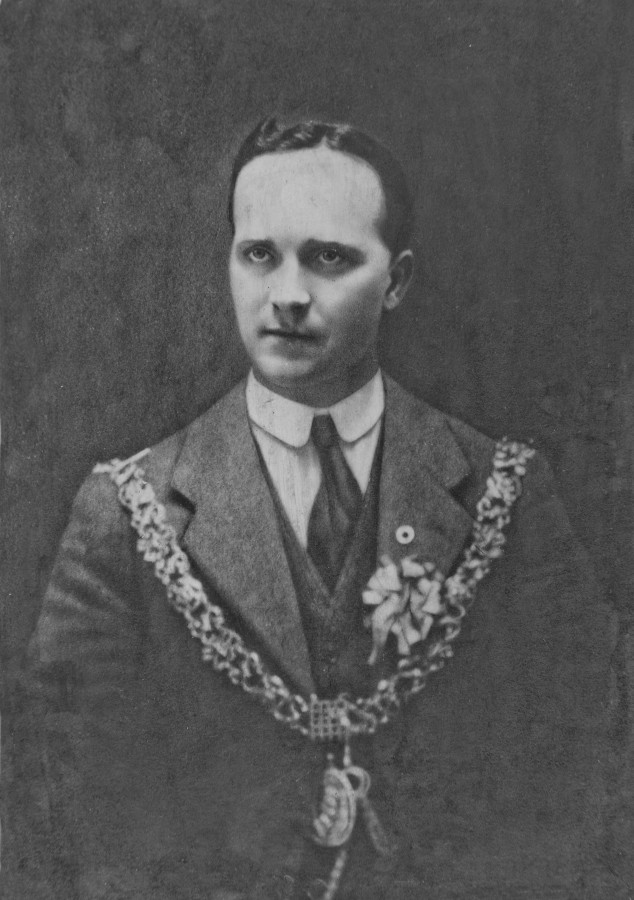
Kieran’s Our City, Our Town Article, 30 January 2020
Remembering 1920: Arise Lord Mayor Alderman Tomás MacCurtain
On 30 January 1920, one hundred years ago, the scene was set for Alderman Tomás MacCurtain to be declared elected as Lord Mayor in the Council Chamber of the old Cork City Hall. As Tomás rose from his seat in the Chamber to go to the Lord Mayor’s chair, much of the general public present cheered him. The men waved their hats and caps and the women their handkerchiefs. “The Soldier’s Song” was called for, and others shouted; “Up Blackpool” and as the newly-elected Lord Mayor signed the declaration accepting the office, The Soldier’s Song was sung.
The Cork Examiner outlines that Alderman MacCurtain signed the roll of office and on receiving the chain of office, the outgoing Lord Mayor, William F O’Connor addressed him, saying; “I congratulate you, and your party, on your election to this high office. I wish you a happy and prosperous year of office, and I trust that under your chairmanship, as first citizen, of Cork that the members of the Corporation shall strive unitedly in using their best efforts to advance our city’s interests and prosperity”.
Addressing the members, Tomás said his first duty was to thank Councillor O’Connor for his kind remarks on the taking the chair. He also thanked the members of the Corporation for having unanimously elected him to the position. He also wished to avail of the opportunity to thank the people of his ward who elected him alderman with a huge vote on the day of the election.
Tomás felt that in accepting the position of Lord Mayor he had a double duty to perform. Elected as he had been, as a Republican, he deemed his first duty would be to serve the principles of the Irish Republic. His next duty would be, as far as it were in his power, “to assist every party and every man and every citizen who had the interest of the country at heart in furthering the country’s interests, including local enterprises and especially the larger issue of the freedom of their country”. In carrying out his duties he denoted that every member, no matter to what party he or she belonged, would get every opportunity of putting forward any idea that he or she had in connection with the welfare of their city and their country.
Tomás continued in his speech that there were certain things in connection with the administration of the Corporation in the past that should be forgotten about and other aspects that should be emulated going forward. He expected from the members of the new Corporation a “sacrifice of time and a sacrifice, perhaps, of personal interest”. He expected from every member, no matter to what party they belonged to, that no self-interest would be put before the interest of the community at large.
Tomás recognised that his Sinn Féin party were very pleased at the result of the municipal elections. They were also pleased that certain minorities were represented in the Council, because they recognised that in every staple community they had minorities that were entitled to representation in the government of the affairs of the country. Their motto in the future would, in the first instance, be self-reliance and, in their normal business of the Corporation, efficiency and economy. He also referenced the importance of the Irish language: “The opening of their proceedings had been very auspicious for one thing that was very dear to his heart, as it was also dear to the heart of the Irish people and that was the Irish language”. He was delighted to hear it introduced into their proceedings. He hoped they would preserve that bi-lingual attitude in the Corporation proceedings until they had a Corporation in the future in which the business would only be completely conducted in the language of their country.
The minutes of the meeting, which survive in Cork City and County Archives, describe that the next business was to fix the Lord Mayor’s salary, which was set at £500 for the year. It was also decided to hold the quarterly meetings of the Council on the second Friday of April, July and October 1920 at 7pm.
The next business was to select three gentlemen qualified to fill the office of High Sheriff, so as to enable the Lord Lieutenant, to select out of the list the new High Sheriff. Sinn Féin Alderman Tadgh Barry said that that was a matter that deserved the very careful consideration of the Corporation. Sinn Féin had had a divided mind on the matter. He articulated that he had read the oath and stated – “it was an oath that no self-respecting Irishman could take”. They were not going to ask any Irishman to take it. It was a position created by what he described as “an alien Government in the country”; Tadgh continued “While in the past some people had been proud to take such a job, they would have nothing to do with such people in the future”. He moved and was successful that they do not fill the office, and that they leave it to Lord French to consider his own candidate.
Alderman Liam de Róiste then proposed a resolution that the Council pledge their allegiance to Dáil Éireann. Councillor Terence MacSwiney seconded, and it was passed by majority. He said that the authority of the Council must be definitely subject to some allegiance and they had next to consider what was the properly constituted authority in this country. Election of members to various committees was held at the subsequent Council meeting.
Captions:
1033a. Lord Mayor Alderman Tomás MacCurtain on his mayoral election night, 30 January 1920 (source: Cork City Museum).
1033b. Members of Cork Corporation in the old Council Chamber of the old Cork City Hall, 30 January 1920 (source: Cork City Museum).
